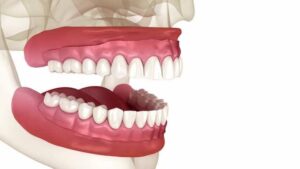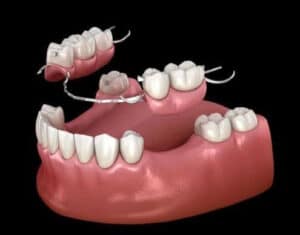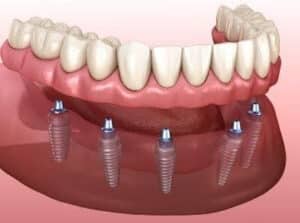Dentures
One option for replacing missing teeth is dentures, which can be custom-made and fitted by your dentist. Dentures are a cost-effective solution for replacing teeth lost due to decay, gum disease, or trauma. If you’re missing teeth, your dentist may recommend dentures as a way to restore both function and appearance.
Dentures are artificial teeth designed to replace lost natural teeth and surrounding tissues. They are suitable for people of all ages and can be either a temporary or permanent solution. Typically made from acrylic resin or lightweight metal (such as cobalt chrome), dentures are crafted to resemble your natural teeth as closely as possible.
There are three main types of dentures:
- Full Dentures: These are used when all the teeth in the upper or lower jaw (or both) are missing. Full dentures replace the missing teeth and rest on the gum ridges, providing support for your lips and cheeks. They also help maintain the distance between your nose, mouth, and chin. Without replacement teeth, this distance may decrease over time as the soft tissues collapse in.

- Partial Dentures: They are typically used when some natural teeth are still present, helping to fill the gaps where teeth are missing. Partial dentures are held in place with clasps that attach to the remaining teeth and may have a base made of acrylic resin or metallic cobalt-chrome. Your dentist will discuss which material option is best for you.

- Removable Implant-Retained Dentures: These are an alternative to the traditional full dentures. These dentures are partially supported by dental implants embedded in the jawbone and partially by the gums. They can be removed by the wearer but remain secure during everyday use.

Both full and partial dentures should be removed daily for cleaning and at night while you sleep.
Dentures are tailored to fit your mouth, but, like new shoes, they might feel slightly uncomfortable or irritating at first. You may need to visit your dentist for minor adjustments during the initial adjustment period.
If you’re having teeth extracted and require a denture, your dentist may recommend waiting a few months for the gums to heal before fitting your final denture, reducing the need for adjustments.
In some cases, an immediate denture can be fitted on the same day as your tooth extraction, though this may require additional follow-up visits for further adjustments. This is done generally when extracting multiple teeth that require immediate replacement to continue function or when removing a front tooth for aesthetic purposes.



